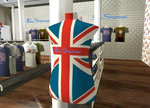Interviews// IGA Worldwide - The Future of In-Game Advertising
We have seen people on those forums saying, this is really good we take it all back...
People:
Ed Bartlett
Games: Test Drive: Unlimited CustomPlay Golf (PC) Counter Strike (Xbox) Trackmania (PC) Worms 3D
Games: Test Drive: Unlimited CustomPlay Golf (PC) Counter Strike (Xbox) Trackmania (PC) Worms 3D
SPOnG: Let’s talk more generally about the in-game advertising industry – firstly, why do you think that the industry is recently exploding in terms of growth?
Ed Bartlett: It has been a remarkably quick-growth industry... if you look at the games sector everything appears to happen very quickly in games. I think it's a combination of two factors, one of which being publishers really needing new revenue streams. I think so many gamers picture publishers to be these big modern uber-corporations pocketing their cash. It couldn't be further from the truth, I've seen almost every company I've come across [in my time in the games industry] close down. In 2001 alone 51 companies went out of business in that year alone. Which is pretty bad?
The other side of the industry is that TV has been fragmenting, so online has become the next big thing for advertisers. And, more recently, branded content like the V Festival, anything that associates a brand with a person's favourite pastime. In-game advertising brings together all of those things, it generates more business for publishers and we are also able to deliver 'above-the-line advertising' so we serve above the line creative, image based campaigns and also are able to track how many people have seen it.
SPOnG: Many ‘hardcore’ gamers are strongly opposed to the mere idea of more advertising in their games – what might you say to convince or appease this audience?
Ed Bartlett: These people don't want to think that there's any need for this. You can't reason with these kinds of people. I was a hardcore gamer and it's pointless for me to try and reason with them. You only have to look at Google and see how many companies have gone out of business in the last five years, that’s just going to get worse.
We had a lot of people come back from EA's Battlefield 2142 saying, how are you going to get advertising in? Now you go onto the forums - and we actually advertised a Discovery Channel show called Future Weapons - and we have seen people on those forums saying, this is really good we take it all back, so people can be converted.
SPOnG: We are fairly used now to seeing major brands advertised on in-game billboards and hoardings – in, for example, football, driving and other sports titles – but what other types of MORE SUBTLE advertising opportunities are you offering? Experiential product placement and the like….? Are we going to see Gordon Freeman using a Nokia phone and sporting retro Adidas trainers in a future version of Half Life!?
Ed Bartlett: [laughs] I'm sure we will see some characters but I couldn't specifically comment on any Valve games. We would never put ads in like that, unless, you know, it's relevant. Look at Battlefield 2142, look at the landscapes, those kind of futuristic cityscapes, so our brands will happily future-cast their product. It's a similar thing with Minority Report and lots of Hollywood films, it kind of affiliates them with their audience and creates and affinity that wasn't there before.
There were always ways around this, you will never see us put adverts on Medieval Castle walls. We are treating this like a low volume, high value media. Our model isn't to flood the market, as it has a negative effect on the pricing. The majority of developers we work with put that money straight back into development.
As to the subtle advertising, just look at how we integrated Ben Sherman with Test Drive Unlimited, where you actually have a fully branded store and a whole part of the game is to be able to build up your character, buy lots of cars, and collect a wardrobe of clothing. Ben Sherman fits in perfectly with this, so we have a whole virtual store of theirs in the game and they have their entire clothing range in there. A player who doesn't really know the Ben Sherman range could go into the game and see the clothes and think, yeah I'll check that out.
SPOnG: As well as in-game ads, you also look at ‘out-of-game’ co-promotional opportunities for publishers – can you say what these are and give a few examples?
Ed Bartlett: So with Ben Sherman, at the same time the game launched at the game pods they were giving away Ben Sherman clothes and goodies alongside the launch and they had pods in their stores playing the game. At the moment we are doing stuff like on-pack promotions where you get codes on products that unlock new content in the game. There is an awful lot of stuff you can do outside of the game and brands love it as they get double exposure in games magazines and vice-versa, plus the publishers love it as they get in Max Power and mainstream press. So this is a great way for publishers to be able to promote their titles to mainstream audiences without spending big bucks.
SPOnG: Going on to broader trends in the videogame industry – with Wii for example, Nintendo is fairly aggressively looking to broaden the traditional gaming demographic outside of the core 18-34 year old male demographic. What impact does this have on your business? Are you currently working (or looking to work) with any non-traditional brands to specifically appeal to these new markets (women, the elderly, the casual gamer and so on…)?
Ed Bartlett: It's great for us as it's exactly what we're doing. The reason we started off with that core market was because that was where most of the budget goes and the fact that fitted exactly with the game market and it's the whole reason advertisers moved into the market.
We're broadening out now to female gamers and older, 'grey' gamers (if you will) and younger gamers. We have very strict details with age ratings and what we can and can't do, especially for minors. From Wii’s perspective I think Wii will be a very popular demographic and everyone I know who owns a 360 have bought Wiis as well and are spending a lot of time trying to beat each others' scores on golf, bowling and... Once you get the more serious games it will be quite a serious little gaming tool. That could make that platform good for advertising.
SPOnG: What about the recent smash-hit Burger King games – which have sold around the same amount of units as Gears of War! – are you working on developing specific games for any clients at the moment along these lines?
Ed Bartlett: We don't do it, we've facilitated it in the past. It's not scaleable enough for us, we're about the more scaleable opportunities. There aren't going to be enough brands wanting those kinds of games to sustain an industry. I think things like downloadable content will be popular and kinds of games will be able to maintain that. Those kinds of things are going to be huge. I think that 360 and PS3 are going benefit from that.
Ed Bartlett: It has been a remarkably quick-growth industry... if you look at the games sector everything appears to happen very quickly in games. I think it's a combination of two factors, one of which being publishers really needing new revenue streams. I think so many gamers picture publishers to be these big modern uber-corporations pocketing their cash. It couldn't be further from the truth, I've seen almost every company I've come across [in my time in the games industry] close down. In 2001 alone 51 companies went out of business in that year alone. Which is pretty bad?
The other side of the industry is that TV has been fragmenting, so online has become the next big thing for advertisers. And, more recently, branded content like the V Festival, anything that associates a brand with a person's favourite pastime. In-game advertising brings together all of those things, it generates more business for publishers and we are also able to deliver 'above-the-line advertising' so we serve above the line creative, image based campaigns and also are able to track how many people have seen it.
SPOnG: Many ‘hardcore’ gamers are strongly opposed to the mere idea of more advertising in their games – what might you say to convince or appease this audience?
Ed Bartlett: These people don't want to think that there's any need for this. You can't reason with these kinds of people. I was a hardcore gamer and it's pointless for me to try and reason with them. You only have to look at Google and see how many companies have gone out of business in the last five years, that’s just going to get worse.
We had a lot of people come back from EA's Battlefield 2142 saying, how are you going to get advertising in? Now you go onto the forums - and we actually advertised a Discovery Channel show called Future Weapons - and we have seen people on those forums saying, this is really good we take it all back, so people can be converted.
SPOnG: We are fairly used now to seeing major brands advertised on in-game billboards and hoardings – in, for example, football, driving and other sports titles – but what other types of MORE SUBTLE advertising opportunities are you offering? Experiential product placement and the like….? Are we going to see Gordon Freeman using a Nokia phone and sporting retro Adidas trainers in a future version of Half Life!?
Ed Bartlett: [laughs] I'm sure we will see some characters but I couldn't specifically comment on any Valve games. We would never put ads in like that, unless, you know, it's relevant. Look at Battlefield 2142, look at the landscapes, those kind of futuristic cityscapes, so our brands will happily future-cast their product. It's a similar thing with Minority Report and lots of Hollywood films, it kind of affiliates them with their audience and creates and affinity that wasn't there before.
There were always ways around this, you will never see us put adverts on Medieval Castle walls. We are treating this like a low volume, high value media. Our model isn't to flood the market, as it has a negative effect on the pricing. The majority of developers we work with put that money straight back into development.
As to the subtle advertising, just look at how we integrated Ben Sherman with Test Drive Unlimited, where you actually have a fully branded store and a whole part of the game is to be able to build up your character, buy lots of cars, and collect a wardrobe of clothing. Ben Sherman fits in perfectly with this, so we have a whole virtual store of theirs in the game and they have their entire clothing range in there. A player who doesn't really know the Ben Sherman range could go into the game and see the clothes and think, yeah I'll check that out.
SPOnG: As well as in-game ads, you also look at ‘out-of-game’ co-promotional opportunities for publishers – can you say what these are and give a few examples?
Ed Bartlett: So with Ben Sherman, at the same time the game launched at the game pods they were giving away Ben Sherman clothes and goodies alongside the launch and they had pods in their stores playing the game. At the moment we are doing stuff like on-pack promotions where you get codes on products that unlock new content in the game. There is an awful lot of stuff you can do outside of the game and brands love it as they get double exposure in games magazines and vice-versa, plus the publishers love it as they get in Max Power and mainstream press. So this is a great way for publishers to be able to promote their titles to mainstream audiences without spending big bucks.
SPOnG: Going on to broader trends in the videogame industry – with Wii for example, Nintendo is fairly aggressively looking to broaden the traditional gaming demographic outside of the core 18-34 year old male demographic. What impact does this have on your business? Are you currently working (or looking to work) with any non-traditional brands to specifically appeal to these new markets (women, the elderly, the casual gamer and so on…)?
Ed Bartlett: It's great for us as it's exactly what we're doing. The reason we started off with that core market was because that was where most of the budget goes and the fact that fitted exactly with the game market and it's the whole reason advertisers moved into the market.
We're broadening out now to female gamers and older, 'grey' gamers (if you will) and younger gamers. We have very strict details with age ratings and what we can and can't do, especially for minors. From Wii’s perspective I think Wii will be a very popular demographic and everyone I know who owns a 360 have bought Wiis as well and are spending a lot of time trying to beat each others' scores on golf, bowling and... Once you get the more serious games it will be quite a serious little gaming tool. That could make that platform good for advertising.
SPOnG: What about the recent smash-hit Burger King games – which have sold around the same amount of units as Gears of War! – are you working on developing specific games for any clients at the moment along these lines?
Ed Bartlett: We don't do it, we've facilitated it in the past. It's not scaleable enough for us, we're about the more scaleable opportunities. There aren't going to be enough brands wanting those kinds of games to sustain an industry. I think things like downloadable content will be popular and kinds of games will be able to maintain that. Those kinds of things are going to be huge. I think that 360 and PS3 are going benefit from that.
People:
Ed Bartlett
Games: Test Drive: Unlimited CustomPlay Golf (PC) Counter Strike (Xbox) Trackmania (PC) Worms 3D
Games: Test Drive: Unlimited CustomPlay Golf (PC) Counter Strike (Xbox) Trackmania (PC) Worms 3D
Read More Like This
Comments
This comes down to one thing and one thing alone - money. If there was no money in it, you absolutely wouldn't find anyone doing it.
This stinks. Welcome to the future.
This stinks. Welcome to the future.
dude, sorry to pop your bubble, but games developers and publishers don't make and publish games in order to ennoble our culture... they make them to make money... so surely if in-game ads can help them make the money they need to make better games... then, if done properly, they could (whisper it) actually be a good thing, no?





